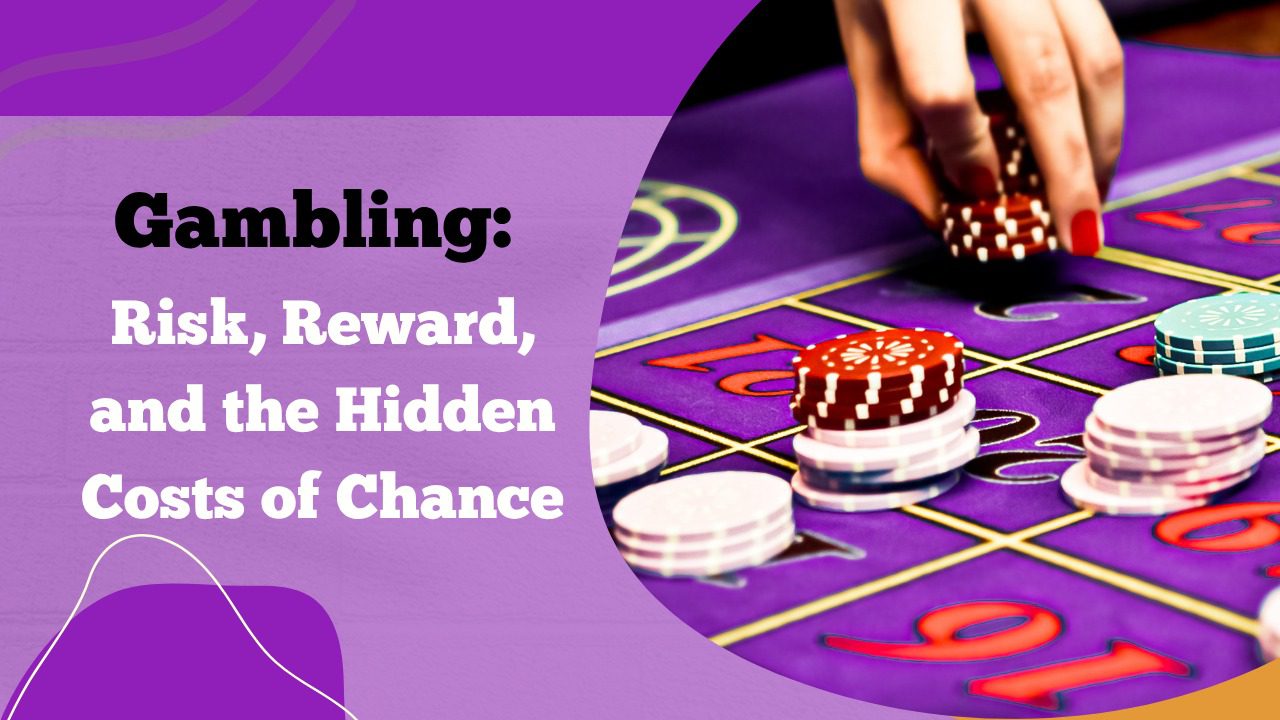Gambling has been a part of human culture for thousands of years, evolving from ancient practices like casting lots to modern-day casinos and online platforms. At its core, gambling involves risking something valuable, typically money, on an uncertain outcome in hopes of winning a greater reward. Over time, gambling has grown into a global industry with a wide range of activities.
For many, gambling is seen as a harmless form of entertainment, providing excitement and the chance to win big. However, for others, it can become a destructive habit, leading to serious financial, psychological, and social consequences. The appeal of gambling lies in the thrill of uncertainty and the hope of winning, but it often comes with significant risks.
The gambling industry is heavily regulated in many countries, with rules in place to protect consumers and prevent addiction. While some people enjoy gambling responsibly, the potential for harm is high, making it essential for individuals to approach it with caution and for societies to ensure proper regulation and support systems are in place.

A Brief History of Gambling
Gambling has a long history, with evidence of its existence dating back to ancient civilizations. In Ancient China around 2300 B.C., Egypt, and Greece, various forms of gambling were practiced. The Romans and Chinese emperors were particularly fond of gambling. The first recorded lottery occurred during the Han Dynasty, which was used to fund government projects, including parts of the Great Wall.
During medieval Europe, gambling was popular yet controversial. While religious authorities often frowned upon it, the elite enjoyed various gambling activities. Despite its opposition, gambling continued to thrive in certain circles.
The gambling landscape took a significant turn in the 1600s with the opening of the first official casino, the Ridotto, in Venice. This marked a shift towards more formalized gambling establishments. The Ridotto became a model for future casinos, paving the way for modern gambling industries.
By the 20th century, gambling had become a global industry, with cities like Las Vegas and Macau emerging as major gambling hubs. Today, gambling remains an integral part of entertainment and culture worldwide, continuously evolving with the times.
Types of Gambling
Gambling comes in many forms, each with its own unique characteristics, appeal, and level of risk:
a. Casino Gambling
Casino gambling includes a wide variety of games such as poker, blackjack, roulette, baccarat, and slot machines. These games are generally structured with odds that favor the house, meaning the casino has a higher chance of winning. However, players still enjoy the excitement of these games and the potential to win significant amounts of money. Whether it’s the strategy of poker, the thrill of roulette, or the simplicity of slot machines, casino gambling offers a dynamic environment where both skill and luck play a role in determining the outcome.
b. Sports Betting
Sports betting involves placing wagers on the outcome of various sports events, ranging from horse racing to football, basketball, and even niche sports like eSports. This form of gambling has grown immensely in popularity, especially with the advent of technology and the legalization of betting in various parts of the world. Sports betting platforms now allow fans to place bets on live games, prop bets, and fantasy sports, making it easier for people to engage with their favorite sports in a more interactive way.
c. Lottery
Lotteries are state-operated games of chance that offer enormous jackpots, often reaching hundreds of millions of dollars. Although the odds of winning are extremely low, the allure of a life-changing payout draws millions of people to participate. Players typically purchase tickets for a chance to win large sums of money, with the funds raised often supporting public projects, schools, or other community services. The excitement surrounding lotteries stems from the slim chance of hitting the jackpot, making it a popular and widely accessible form of gambling.
d. Online Gambling
Online gambling has grown rapidly due to the rise of the internet, offering a wide array of gambling options. This includes virtual slot machines, poker rooms, and even live dealer games where players can interact with real dealers via a video feed. Online casinos and betting platforms have made gambling more accessible, allowing players to enjoy their favorite games from the comfort of their homes. The convenience of being able to gamble at any time and place has contributed to the explosive growth of online gambling in recent years.

e. Informal Gambling
Informal gambling encompasses activities such as office pools, friendly card games, or bets made between individuals. While these types of gambling are often less regulated and don’t take place in casinos or formal settings, they are still considered forms of gambling. People may bet on the outcome of events like sports games, trivia contests, or even simple competitions like who can run the fastest. Though informal, these activities can still carry risk and often involve small stakes, but the social interaction and lighthearted nature make them appealing in casual settings.
Why People Gamble
Understanding why people gamble is key to grasping its role in society. Here are several reasons people are drawn to gambling:
a. Entertainment and Excitement
For many individuals, gambling is a form of entertainment that provides a unique thrill. The uncertainty of the outcome—whether it’s a poker hand, a roulette spin, or a roll of dice—creates a sense of suspense. The possibility of winning a large sum adds to the excitement, producing an emotional high that keeps people engaged. The combination of risk, chance, and reward makes gambling a captivating experience, offering an adrenaline rush for those who enjoy the challenge and unpredictability of the games.
b. Hope of Financial Gain
A significant motivator for gambling is the hope of financial gain, particularly the dream of hitting the jackpot and drastically improving one’s life. The idea of a “get rich quick” scenario can be very alluring, especially in times of financial difficulty or personal hardship. The possibility of winning large sums of money offers a sense of hope and can lead individuals to gamble with the expectation that they will strike it rich, even though the odds are often against them. This hope of a life-changing win can drive people to take risks they might not otherwise consider.
c. Social Interaction
Gambling often offers a social experience that brings people together. Casinos, betting events, and informal betting among friends provide a space for social interaction and camaraderie. Games like poker or sports betting are often enjoyed in groups, where players engage in conversation, share in the excitement of the game, and sometimes celebrate or commiserate together. For many, gambling serves as a way to bond with others, making it not just about the game itself but also about building connections and enjoying shared moments with friends or strangers alike.
d. Escapism
For some individuals, gambling offers an escape from real-life issues. The immersive nature of gambling can serve as a temporary relief from stress, personal struggles, or emotional difficulties. Whether dealing with work-related stress, family problems, or mental health challenges, gambling provides a way to momentarily forget about one’s problems. The focus on the game and the excitement of the experience can help people disconnect from their worries, even if only for a short while. However, this temporary relief can sometimes lead to unhealthy patterns if it becomes a regular coping mechanism.
e. Compulsion and Addiction
For certain individuals, gambling shifts from being a form of entertainment to a compulsive behavior. Gambling addiction occurs when individuals feel the need to gamble regularly, often regardless of the consequences. This type of behavior is no longer driven by enjoyment or hope of winning, but by an overwhelming urge to continue gambling, even when it leads to financial, emotional, or social problems. In extreme cases, this compulsion can cause serious personal harm, as individuals become unable to stop despite negative impacts on their lives. Gambling addiction can be difficult to control and often requires professional help to address.
The Dark Side: Problem Gambling and Addiction
Problem gambling, also known as gambling addiction or gambling disorder, is characterized by an inability to stop gambling despite negative consequences.
a. Signs and Symptoms
Preoccupation with gambling
Needing to gamble with increasing amounts
Lying to family or friends about gambling
Chasing losses (continuing to gamble to win back money)
Borrowing or stealing money to fund gambling

b. Psychological Effects
Gambling addiction is associated with anxiety, depression, and suicidal thoughts. The emotional rollercoaster of wins and losses can wreak havoc on mental health.
c. Financial Ruin
Many problem gamblers end up in severe debt. The loss of savings, homes, and livelihoods is not uncommon.
d. Relationship Strain
Gambling problems often lead to conflicts, broken relationships, and even domestic violence.
e. Co-occurring Disorders
Many gamblers also suffer from substance abuse, mood disorders, and other addictive behaviors.
The Gambling Industry: A Multibillion-Dollar Juggernaut
a. Economic Impact
The gambling industry has become a massive global economic force, generating hundreds of billions of dollars annually. In 2023, it was estimated to be worth over $500 billion, reflecting its substantial contribution to the global economy. Gambling supports a wide range of industries by creating jobs in casinos, online platforms, and hospitality services. It also stimulates tourism, with many people traveling to gambling hubs like Las Vegas and Macau. Additionally, the industry contributes significant tax revenue, which is often allocated to public services and infrastructure, benefiting local and national economies.
b. Online Boom
The rise of mobile and online gambling has transformed the industry, making it more accessible than ever before. With the growth of smartphones and the internet, users can now gamble at any time, from any place, by accessing a variety of online platforms. This shift has brought both convenience and risk, as players no longer need to visit physical casinos. The ability to gamble 24/7 has led to increased participation and revenue, but it has also raised concerns about the potential for problem gambling, as individuals may find it more difficult to control their habits when gambling is so easily accessible.
c. Marketing Strategies
The gambling industry employs aggressive marketing strategies to attract and retain customers. Many of these strategies glamorize gambling, portraying it as an exciting and glamorous activity. Companies often target young, impressionable audiences through sponsorships, advertisements, and promotions. Sports teams, events, and online platforms are frequently used to reach a wide range of potential gamblers, particularly those who may be more vulnerable to developing gambling habits. This marketing approach raises concerns about the industry’s responsibility in protecting vulnerable individuals from potential harm.
Legal and Ethical Considerations
a. Regulation
Gambling laws vary widely across the globe. Some countries like the U.K. and Canada regulate it closely, while others ban it altogether. The U.S. has seen a wave of legalization in online and sports betting in recent years.

b. Responsible Gambling Initiatives
Many governments and casinos promote responsible gambling through tools like self-exclusion programs, spending limits, and public awareness campaigns.
c. Ethical Dilemmas
There is ongoing debate about whether governments should profit from gambling when it causes harm to citizens. Additionally, targeting vulnerable populations raises serious ethical questions.
Gambling and Technology
a. Mobile and Online Platforms
The rise of smartphones and mobile apps has greatly expanded access to gambling, providing users with the ability to gamble anytime and anywhere. This convenience has significantly increased participation in gambling, particularly among younger generations who are more tech-savvy and accustomed to using mobile devices. Whether through online casinos, sports betting apps, or other gambling platforms, individuals can now place bets, play games, and track outcomes on the go. While this has made gambling more accessible, it has also raised concerns about its impact, especially on younger people who may struggle with controlling their gambling habits due to the ease of access.
b. Artificial Intelligence
Artificial intelligence (AI) is becoming a powerful tool in the gambling industry, enhancing the overall user experience. AI is used to personalize gambling experiences by tailoring game suggestions and promotions based on an individual’s preferences and behaviors. It also helps analyze betting patterns to predict outcomes and identify at-risk individuals who may be developing problematic gambling behaviors. While AI can be beneficial in terms of user engagement and responsible gambling, it can also be misused by companies to encourage more spending, using data to create targeted offers and promotions that may entice users to gamble beyond their limits.
c. Virtual Reality and the Metaverse

The gambling industry is exploring new frontiers with virtual reality (VR) and the metaverse, which offer immersive digital experiences. Some casinos are now moving into virtual worlds where users can navigate digital casino floors, interact with other players, and participate in games using avatars. These virtual environments replicate the excitement of physical casinos but with added flexibility and the potential for more engaging and interactive experiences. As the metaverse continues to evolve, it’s likely that VR casinos will become more popular, offering a new form of entertainment that combines technology with the traditional thrills of gambling.
Preventing and Treating Gambling Addiction
a. Prevention
Education, awareness, and early intervention are crucial. Teaching financial literacy and self-control from a young age can reduce future problems.
b. Treatment Options
Therapy: Cognitive Behavioral Therapy (CBT) is effective for many problem gamblers.
Support Groups: Gamblers Anonymous offers peer support in a non-judgmental environment.
Medication: In some cases, medications used for depression or impulse control disorders are prescribed.
Helplines and Online Resources: These provide immediate assistance and referrals.
c. Role of Families and Communities
A supportive environment can be instrumental in recovery. Families should be educated on how to recognize signs and intervene appropriately.
Future of Gambling
The future of gambling is likely to be shaped by:
Greater digitization and AI-driven platforms
Stricter regulations, especially around advertising and data use
Crypto-gambling and the use of blockchain technology
Socially responsible innovation, with a focus on ethical gambling practices
Conclusion
Gambling is a multifaceted phenomenon. While it can be a source of fun, social interaction, and economic activity, it also has the potential to ruin lives. Like fire, it can warm a home—or burn it down.
The key lies in balance, regulation, and education. For those who gamble responsibly, it remains a thrilling diversion. But for society, the challenge is to ensure that the thrill does not turn into tragedy. A responsible approach, both at the individual and policy level, can help harness the benefits of gambling while minimizing its harms.
FAQs
- What is gambling ?
Gambling is the act of risking something of value, usually money, on an event with an uncertain outcome in hopes of winning something of greater value. It includes activities like casino games, sports betting, lotteries, and online gambling. - Is gambling legal ?
Gambling laws vary by country and region. In some places, gambling is fully legal and regulated, while in others, it may be restricted or prohibited. Always check local laws before participating in any form of gambling. - What are the risks of gambling ?
The main risks of gambling include financial losses, addiction, and negative impacts on mental and emotional health. For some individuals, gambling can become compulsive and lead to significant personal and financial difficulties. - How does online gambling work ?
Online gambling works similarly to traditional gambling, but it takes place on digital platforms. Players can access casinos, sports betting, and other gambling games through websites or mobile apps. These platforms offer 24/7 access and may include both virtual and live dealer games. - Can gambling become an addiction ?
Yes, gambling can become addictive for some individuals. Compulsive gambling, also known as gambling disorder, is when a person feels the need to gamble continuously despite negative consequences. Treatment options, including therapy and support groups, can help individuals struggling with gambling addiction.




